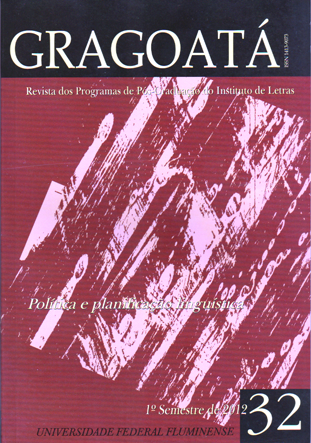A Norma-Padrão Europeia e a Mudança Linguística na Escola Moçambicana
DOI:
https://doi.org/10.22409/gragoata.v17i32.33040Palavras-chave:
norma-padrão, mudança, português moçambicanoResumo
Em Moçambique, a língua portuguesa é considerada língua oficial, língua segunda, língua nacional e concorre com mais de vinte línguas bantu faladas pela maioria da população. A norma-padrão perde espaço dando lugar ao português moçambicano que tem caraterísticas próprias do contexto sociolinguístico do país. A escola se esforça, mas não consegue ensinar essa norma européia devido ao multilinguismo e o contato do português com as línguas africanas, fato que se reflete nos mídias e na literatura oral e escrita. Esta dificuldade resulta em altos índices de reprovações causados pela dificuldade do uso do padrão-europeu por parte de professores e dos escritores que elaboram os livros escolares. Nesta pesquisa sugere-se a padronização da variante moçambicana, bem como a elaboração de dicionários e de gramáticas que ilustrem a realidade sociolinguística de Moçambique para a melhoria da qualidade de ensino e também para a autoestima dos moçambicanos em geral, eliminado assim o preconceito de que os moçambicanos não sabem falar português.Downloads
Downloads
Publicado
Edição
Seção
Licença
AUTORIZAÇÃO
Autores que publicam em Gragoatá concordam com os seguintes termos:
Os autores mantêm os direitos e cedem à revista o direito à primeira publicação, simultaneamente submetido a uma licença Creative Commons Atribuição 4.0 Internacional (CC BY 4.0), que permite o compartilhamento por terceiros com a devida menção ao autor e à primeira publicação pela Gragoatá.
Os autores podem entrar em acordos contratuais adicionais e separados para a distribuição não exclusiva da versão publicada da obra (por exemplo, postá-la em um repositório institucional ou publicá-la em um livro), com o reconhecimento de sua publicação inicial na Gragoatá.
A Gragoatá utiliza uma Licença Creative Commons - Atribuição CC BY 4.0 Internacional.











